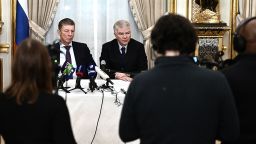Ukrainian President Volodymyr Zelensky will hold a call with President Biden today, his office told CNN.
The conversation is expected to be a “logical continuation of close cooperation, coordination of actions and evidence of support to Ukraine from its reliable partner,” Zelensky’s spokesperson Serhiy Nikiforov said on Facebook.
“The leaders can be expected to address issues of peace, security, including energy, defence cooperation, macro-financial support, and anti-oligarchic reform. However, the list of topics is not exhaustive,” he said.
A source familiar with Zelensky’s thinking told CNN that Ukraine’s leader is expected to air his concerns about the public rhetoric the US and its allies have engaged in surrounding a potential war between Ukraine and Russia.
Zelensky has been particularly concerned about the US’ rhetoric that war could be “imminent” — a word White House press secretary Jen Psaki used earlier this week to describe the US’ assessment of Russia’s plans — and the recent disclosures of intelligence to US media, the source said, which “is causing panic and economic disaster for Ukraine.”?
Zelensky is expected to convey to Biden that he believes the US and its allies have to be more careful with their messaging surrounding the conflict, the source added.?
Ukrainian officials have been similarly unhappy about the US’ decision to order the evacuation of families from the US Embassy in Kyiv, CNN previously reported, which Zelensky warned beforehand would be an “overreaction.”?
Additionally, Zelensky hopes to brief Biden on progress made during talks between Ukrainian and Russian officials in Paris this week, which was “very positive” and is being met with “cautious optimism” by the Ukrainian government, the source said.
It will be the second conversation the presidents have had this month?and the third in two months, Zelensky’s spokesperson said.
The White House confirmed the call would be occurring this afternoon and a readout of the conversation is expected.
CNN’s Maegan Vazquez contributed reporting to this post.














